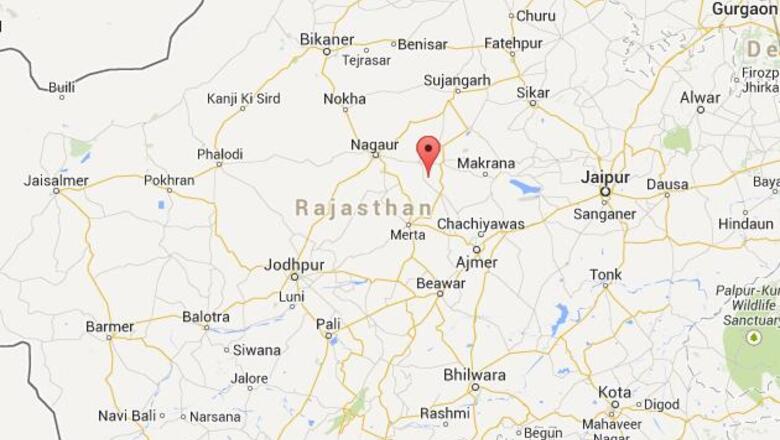
views
Barmer: A Scottish energy major and modern technology have combined to bring about a revolution in two districts of Rajasthan that were infamous due to the scarcity of potable water. Thanks to water ATMs, many otherwise arid villages here have 24x7 access to the commodity at the swipe of a card - at 20 litres for Rs 5.
Under Cairn India's Jeevan Amrit Project, kiosks with reverse osmosis (RO) plants have been installed to provide safe drinking water in villages like Bhakharpur, Kawas, Guda, Jogasar, Aakdada and Baytu to benefit 22,000 people.
"The project is a good example of a PPP model, where Cairn India has partnered with the Rajasthan government's Public Health Engineering Department (PHED), Tata Projects and the respective village panchayats to provide potable drinking water at the doorsteps of the local community," Cairn India CSR head Nilesh Jain told IANS.
Rajasthan, with 10.4 per cent of the country's geographical area, 5.5 per cent of the population and 18.70 per cent of the livestock, has only 1.16 per cent of surface water available in the country.
The state is one of the driest states of the country. Rainfall is erratic and there is a large variation in its distribution pattern in the state. The average annual rainfall ranges from 100 mm in Jaisalmer to 800 mm in Jhalawar.
The cards come with an initial value of Rs 150 and can be recharged for a similar amount. Plans are afoot to also provide Rs 20 recharges.
This makes the dispensers self-sustaining, with the revenue earned used by the village's water committee to meet the running expenses of the RO plant, such as salary of the operator, electricity and maintenance. The surplus money is used to undertake developmental work in the village.
And to maximize its reach, water from the RO plants is transported to the surrounding dhanis (hamlets) through vehicles at nominal charges (Rs 1-2 extra, as decided by the water committee).
The dispensers are getting increasingly popular among the locals with more and more people purchasing the smart cards.
"Once it was difficult to get water, forget about clean water to drink. Now things have changed. I can, at any time, get clean water for my family," Ram Pyari, a resident of Kawas village, told IANS.
Such sentiments are echoed by other users, including Ratna Ram, sarpanch of Sawai Padam Singh village, who became a role model after he inspired more than 100 households in his village to utilize safe drinking water and four another village sarpanchs to initiate the "Jeevan Amrit" project in their gram panchyats.
"My father used to regularly take painkillers for a long time as he suffered from severe joint pain. We have been using RO water for six months now, and miraculously my father has stopped taking medicines for the last two months," Ratna Ram told IANS.
The number of water-borne diseases, such as diarrhea in children, has also come down. Cases of joint pain caused by high fluoride content in drinking water have also decreased.
Cairn India funds the cost of the RO plants, which are delivered and installed by Tata Projects, PHED provides the premises and the source water connection and a 15-member village water committee, formed under the panchayat, is responsible for operation and maintenance of the kiosks. Dhara, the local NGO partner for this project, spreads awareness about safe drinking water among locals and hand-holds the water committee for better success.
Apart from providing an innovative solution to a grave problem, these water kiosks have also proved to be a model of good self-governance. The water committees have created an identity for themselves and are looked upon as an effective social group in the villages. Along with efficiently running the RO plants, the committees are also undertaking many developmental projects.
Cairn India is one of the largest independent oil and gas exploration and production companies in India with a market capitalisation of $10 billion. It was rated the fastest-growing energy company in the world in the 2012 and 2013 Platts Top 250 Global Energy Company Rankings.
Cairn India generates 30 per cent of India's domestic crude oil production. Through its affiliates, Cairn India has been operating for close to 20 years playing an active role in developing India's oil and gas resources. To date, Cairn India has opened four frontier basins with over 40 discoveries, 31 in Rajasthan alone.
The Mangala field in Rajasthan, discovered in January 2004, is the largest onshore oil discovery in India in more than two decades. Mangala, Bhagyam and Aishwariya fields - major discoveries in the Rajasthan block - have gross ultimate oil recovery of over one billion barrels. Each barrel is of 159 litres.




















Comments
0 comment